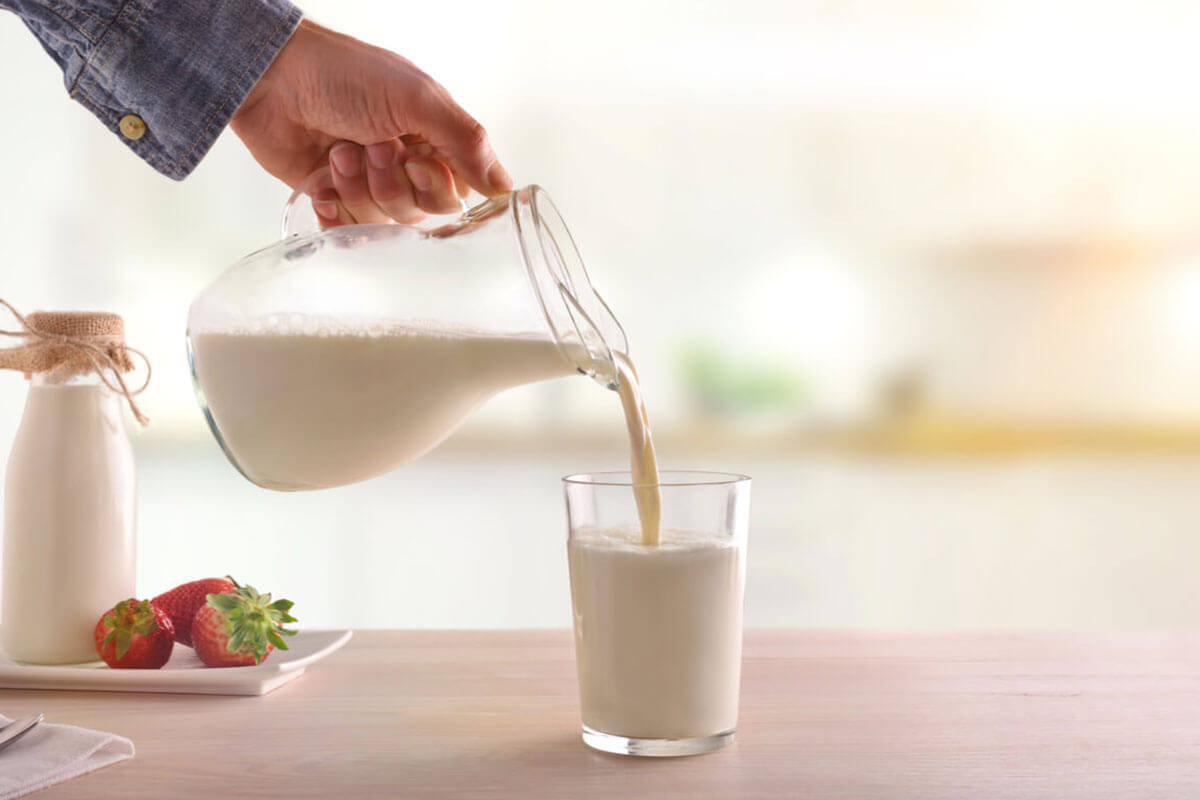Human breast milk is packed with compounds that enhance immunity, including oligosaccharides, antimicrobial proteins, lactoferrin, immunomodulatory cytokines, and immunoglobulins. All of these factors help the immune system mount the appropriate attack on allergens, bacteria, viruses, and other antigens. Colostrum is a type of breast milk that contains these constituents and possesses these health benefits.
What is colostrum?
Just prior to giving birth and shortly after delivery, the mammary glands produce colostrum, a special form of milk that is only available within days of the birth. Often called “first milk,” colostrum is packed with more antibodies than regular breast milk. For example, research shows that regular human breast milk contains around 1 mg/ml of IgA, an important class of immunoglobulins, compared to an impressive 5 to 12 mg/ml in colostrum. (12)
Another important immunoglobulin, IgG, is also found in higher amounts in colostrum. By increasing immunoglobulin activity in the immune system, colostrum provides protection against a wide range of illnesses including infectious diseases and gastrointestinal issues. (6)

Colostrum health benefits
Now that we understand what colostrum is, it’s important to know what colostrum is good for. Because the immune system is so intimately involved in health and illness, it makes sense that colostrum would have a whole host of health benefits attributed to its ability to enhance immunity, reduce inflammation, and protect and heal the gut.
1. Immune support
Active immunity occurs when the immune system learns how to fight an infection itself by producing its own antibodies, while passive immunity is when the body uses externally supplied antibodies for a fight. Colostrum supports passive immunity by supplying maternal antibodies to the baby which it can use to coordinate a defense once the body comes into contact with a foreign cell. (3) Phagocytes are immune cells that “eat” those foreign invaders. A 2012 placebo-controlled, double-blind, randomized cross-over trial showed that a single dose of bovine colostrum significantly increased phagocytic activity. That same study showed a short-term increase in natural killer cell activity within one to two hours after consuming the colostrum. (7)
Colostrum can be especially beneficial during cold and flu season. Research demonstrates that prophylactic colostrum can help reduce the number and severity of upper respiratory tract infections in children. (11) The same is true for adults. A 2003 study featuring adult males showed that bovine colostrum significantly reduced the risk of upper respiratory tract infection compared to placebo. (1) A 2010 study involving prolonged exercise as a physical stressor, showed that four weeks of bovine colostrum supplementation helped prevent decreases in innate immunity parameters and also enhanced the recovery of neutrophils (the body’s most abundant immune cell). (2)
2. Inflammation
Immunity and inflammation go hand in hand, so it’s not surprising that colostrum would have an anti-inflammatory effect. As it turns out, colostrum is also a great source of antioxidants and growth factors that can support a healthy inflammatory response in the body. (13) Bovine colostrum also reduces nuclear factor (NF)kB activation, a proinflammatory pathway. (8)
3. Gut health
In infants, colostrum from early breast milk helps settle and protect a babies’ gut, which at that time is permeable, immature, and fragile. In adults, bovine colostrum may offer significant protection to the intestinal lining. A 2017 double-blind, placebo-controlled study demonstrated that 500 mg of colostrum per day for 20 days resulted in decreased intestinal permeability compared to placebo for athletes during their peak training season. These results suggest that colostrum may decrease intestinal hyperpermeability in athletes, which can be an issue for athletes during peak training season. (4)

Peptic ulcers is an inflammatory condition of the gastrointestinal tract. The two leading contributors to this condition in the United States are the presence of Heliobacter pylori (H. pylori) and non-steroidal anti-inflammatory drug (NSAID) use. A 2015 randomized, double-blind clinical trial demonstrated that bovine colostrum supplementation was able to eradicate H. pylori. (10) Early in vivo research also showed that bovine colostrum helped prevent NSAID-induced gut damage. (5)
Bovine colostrum has also been shown to relieve childhood infectious diarrhea. According to a 2019 meta-analysis featuring five randomized clinical trials, researchers found that “bovine colostrum significantly reduced stool frequency, the occurrence of diarrhea and pathogen detection.” (9)
The bottom line
There are many ways to keep your immune system strong, naturally. Research indicates that colostrum can enhance immune defenses while also helping to control inflammation and support gut health.
- Brinkworth, G. D., & Buckley, J. D. (2003). Concentrated bovine colostrum protein supplementation reduces the incidence of self-reported symptoms of upper respiratory tract infection in adult males. European Journal of Nutrition, 42(4), 228–232.
- Davison, G., & Diment, B. C. (2009). Bovine colostrum supplementation attenuates the decrease of salivary lysozyme and enhances the recovery of neutrophil function after prolonged exercise. British Journal of Nutrition, 103(10), 1425–1432.
- Godhia, M., & Patel, N. (2013). Colostrum – its composition, benefits as a nutraceutical : A review. Current Research in Nutrition and Food Science Journal, 1(1), 37–47.
- Hałasa, M., Maciejewska, D., Baśkiewicz-Hałasa, M., Machaliński, B., Safranow, K., & Stachowska, E. (2017). Oral supplementation with bovine colostrum decreases intestinal permeability and stool concentrations of zonulin in athletes. Nutrients, 9(4), 370.
- Hu, D., Zhang, F., Zhou, J., Xu, B., Zhang, H., Qiang, H., Ren, S., Shan, B., Yin, C., Zhang, Z., Wang, X., Zhao, C., & Shi, Z. (2015). The clearance effect of bovine anti-Helicobacter pylori antibody-containing milk in o blood group helicobacter pylori-infected patients: A randomized double-blind clinical trial. Journal of Translational Medicine, 13(1). https://doi.org/10.1186/s12967-015-0558-1
- Hurley, W. L., & Theil, P. K. (2011). Perspectives on immunoglobulins in colostrum and milk. Nutrients, 3(4), 442–474.
- Jensen, G. S., Patel, D., & Benson, K. F. (2012). A novel extract from bovine colostrum whey supports innate immune functions. II. rapid changes in cellular immune function in humans. Preventive Medicine, 54, S124–S129.
- Lee, A., Pontin, M. C., Kosmerl, E., Jimenez-Flores, R., Moretti, D. B., & Ziouzenkova, O. (2019). Assessment of adipogenic, antioxidant, and anti-inflammatory properties of whole and whey bovine colostrum. Journal of Dairy Science, 102(10), 8614–8621.
- Li, J., Xu, Y. W., Jiang, J. J., & Song, Q. K. (2019). Bovine colostrum and product intervention associated with relief of childhood infectious diarrhea. Scientific Reports, 3093.
- Playford, R. J., Floyd, D. N., Macdonald, C. E., Calnan, D. P., Adenekan, R. O., Johnson, W., Goodlad, R. A., & Marchbank, T. (1999). Bovine colostrum is a health food supplement which prevents NSAID induced gut damage. Gut, 44(5), 653–658.
- Saad, K., Abo-Elela, M. G. M., El-Baseer, K. A. A., Ahmed, A. E., Ahmad, F. A., Tawfeek, M. S. K., El-Houfey, A. A., Aboul_Khair, M. D., Abdel-Salam, A. M., Abo-elgheit, A., Qubaisy, H., Ali, A. M., & Abdel-Mawgoud, E. (2016). Effects of bovine colostrum on recurrent respiratory tract infections and diarrhea in children. Medicine, 95(37), e4560.
- Ulfman, L. H., Leusen, J. H. W., Savelkoul, H. F. J., Warner, J. O., & van Neerven, R. J. J. (2018). Effects of bovine immunoglobulins on immune function, allergy, and infection. Frontiers in Nutrition, 5.
- Yadav, R., Angolkar, T., Kaur, G., & S. Buttar, H. (2016). Antibacterial and antiinflammatory properties of bovine colostrum. Recent Patents on Inflammation & Allergy Drug Discovery, 10(1), 49–53.


